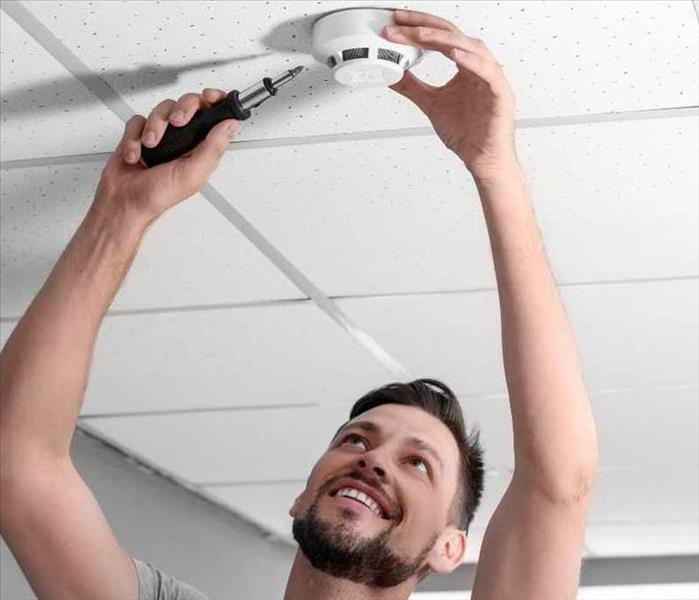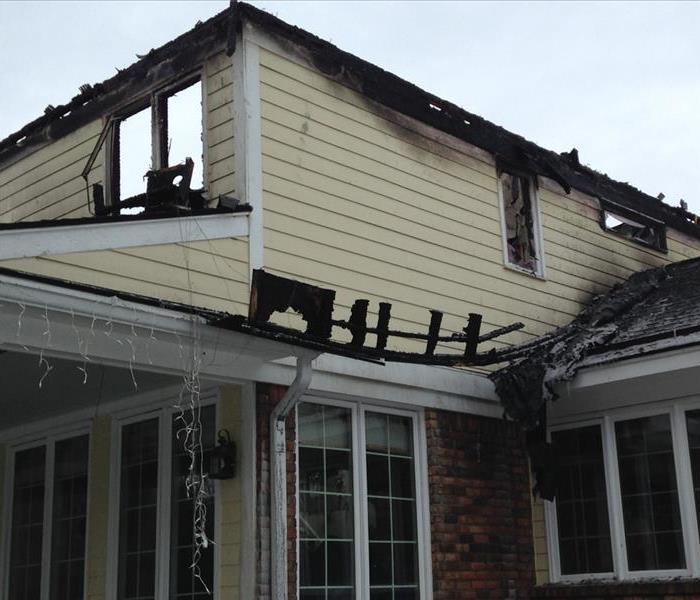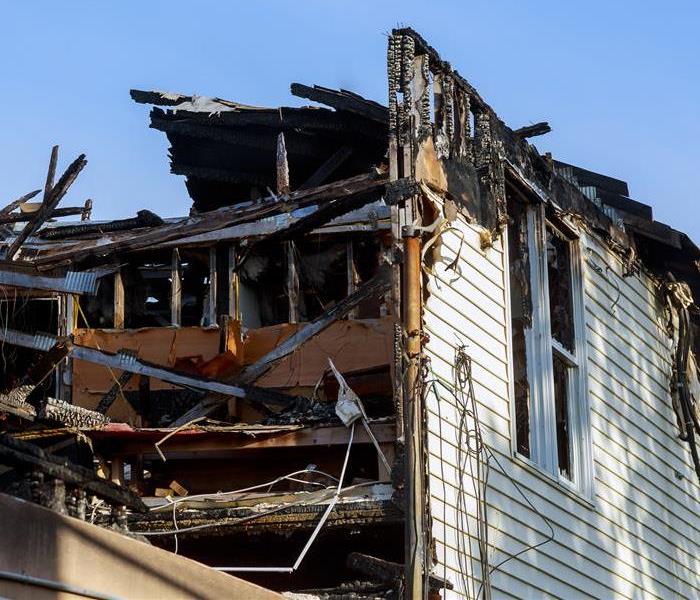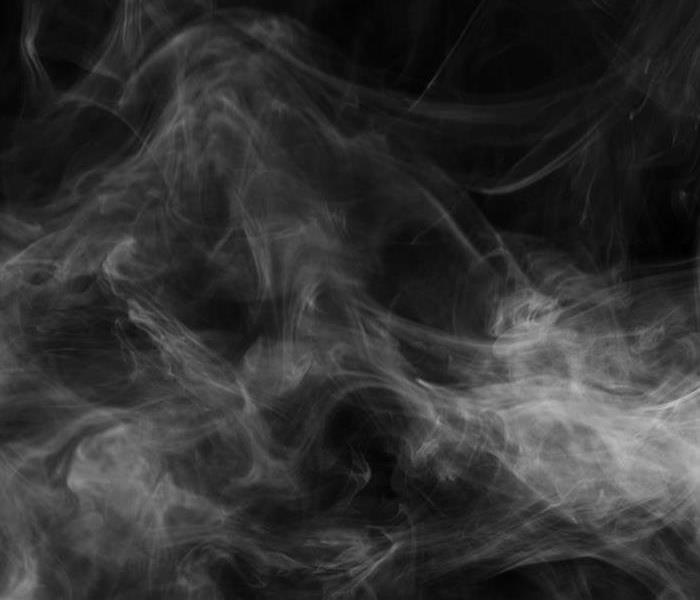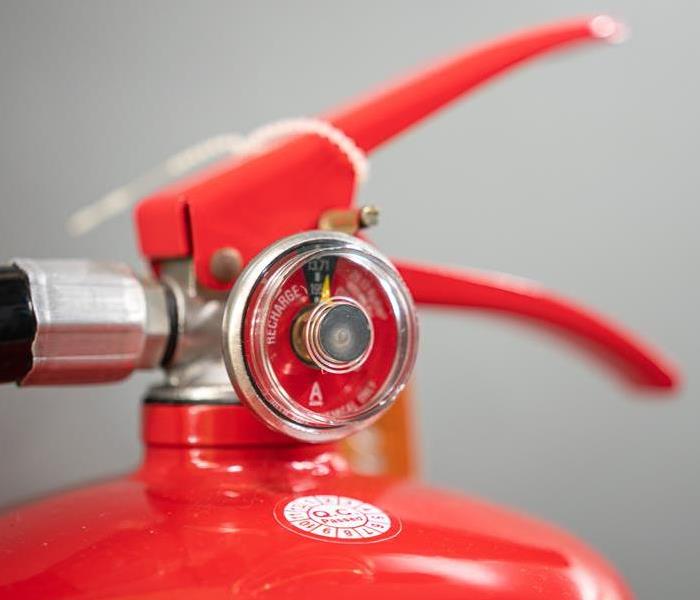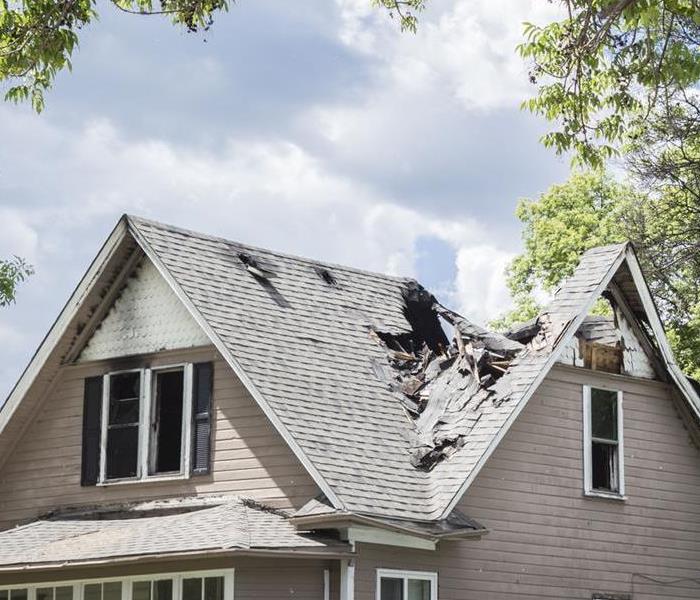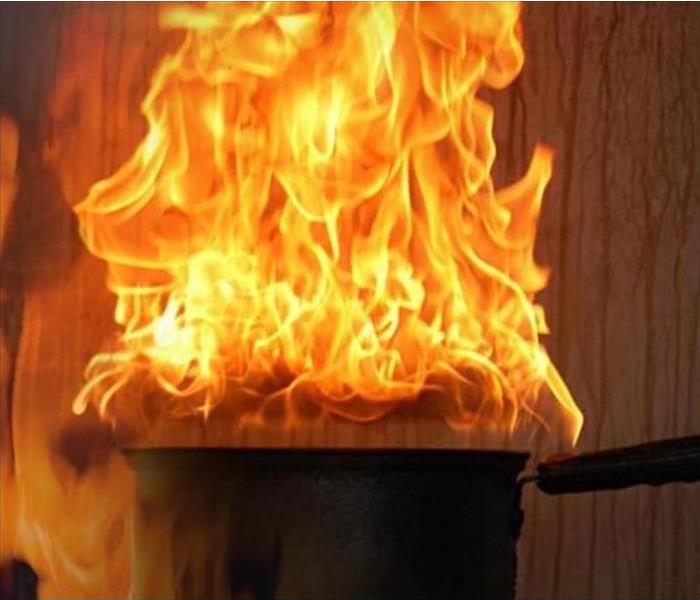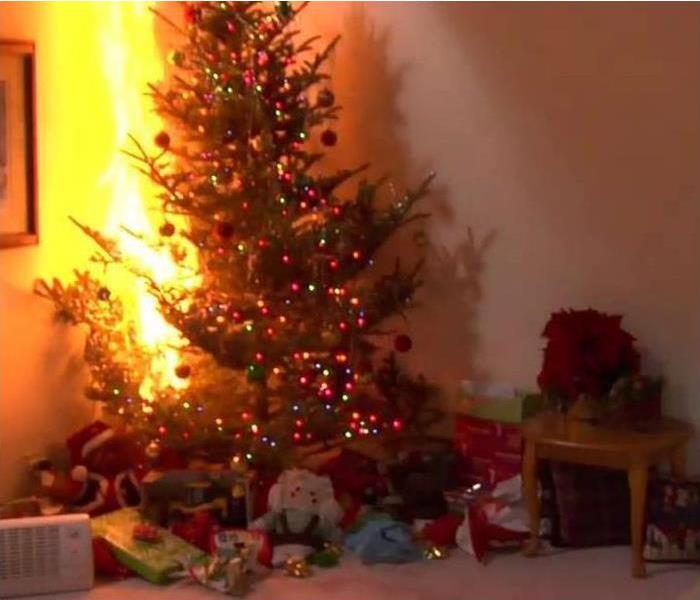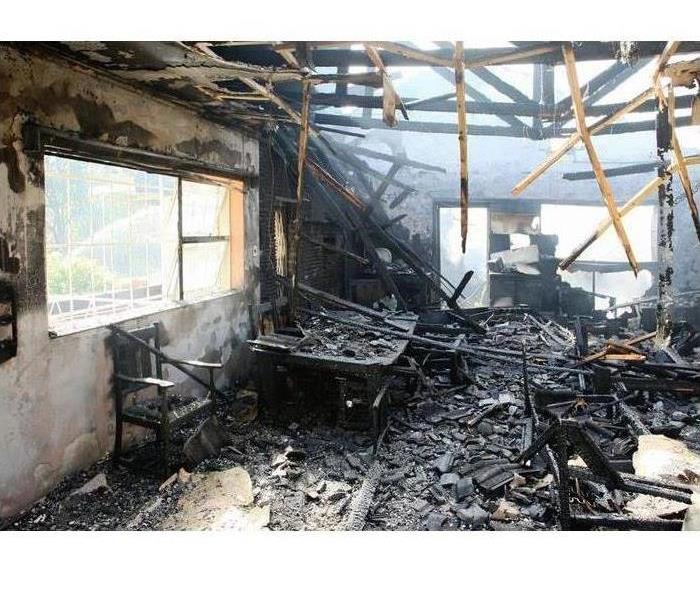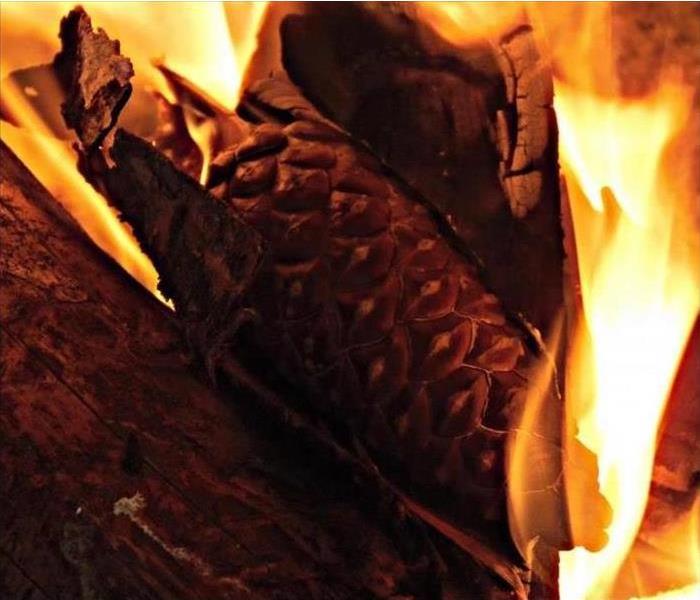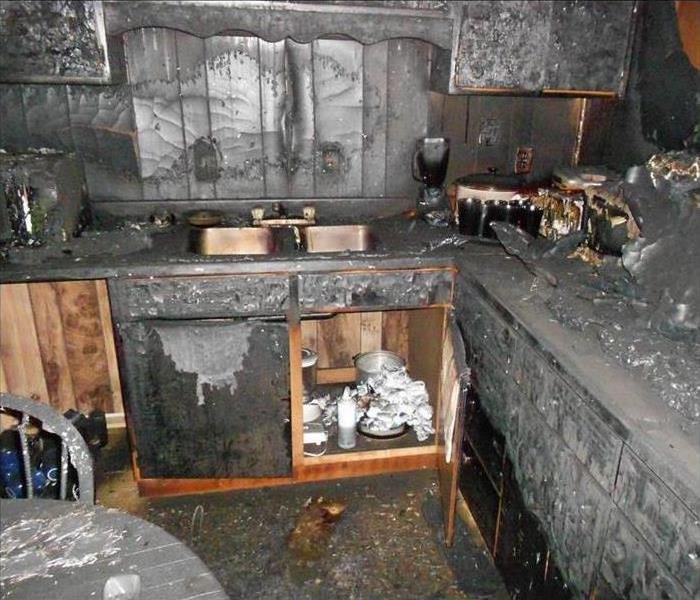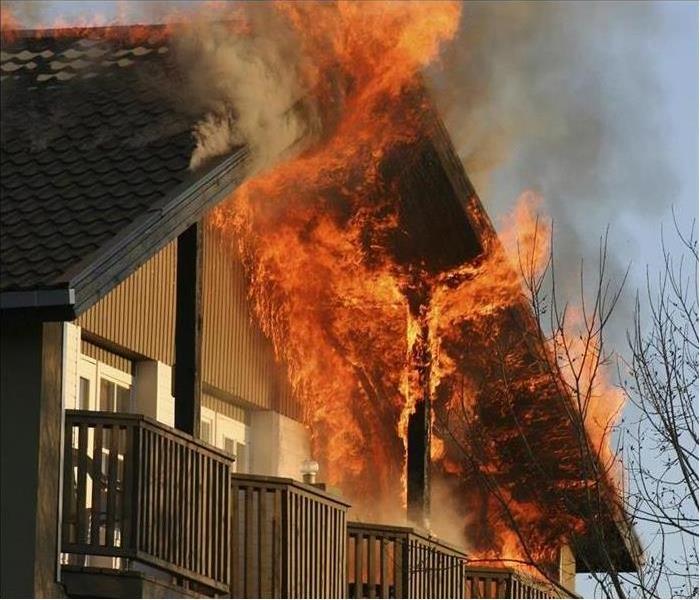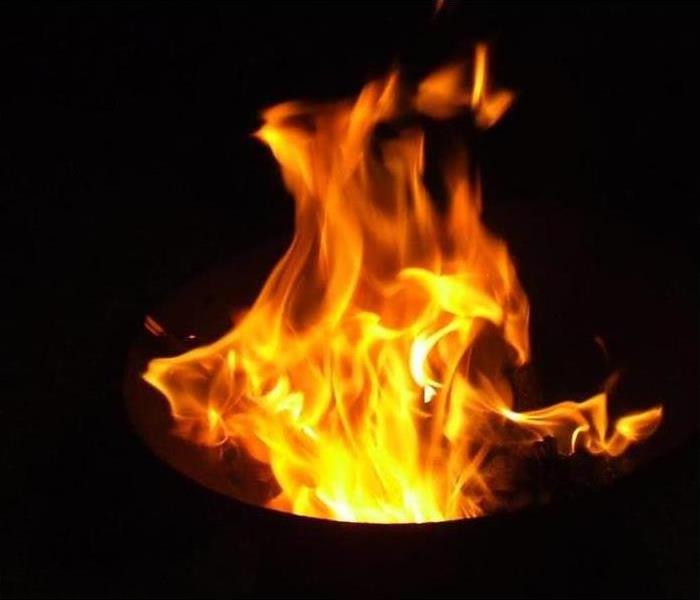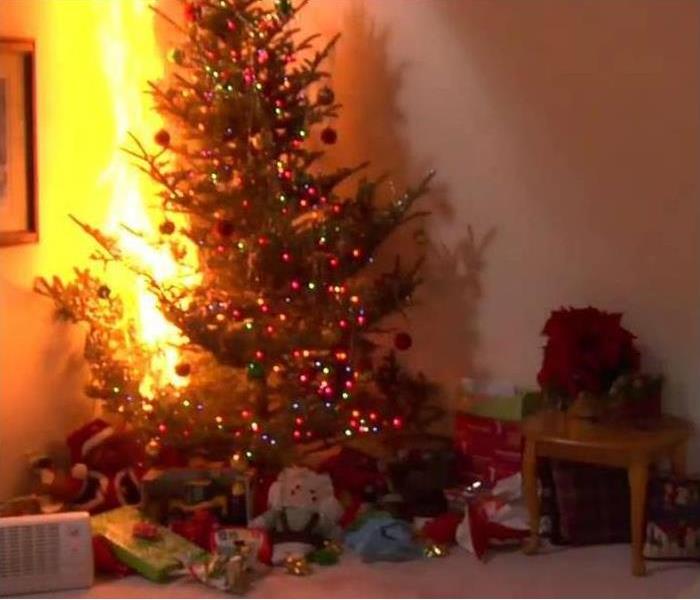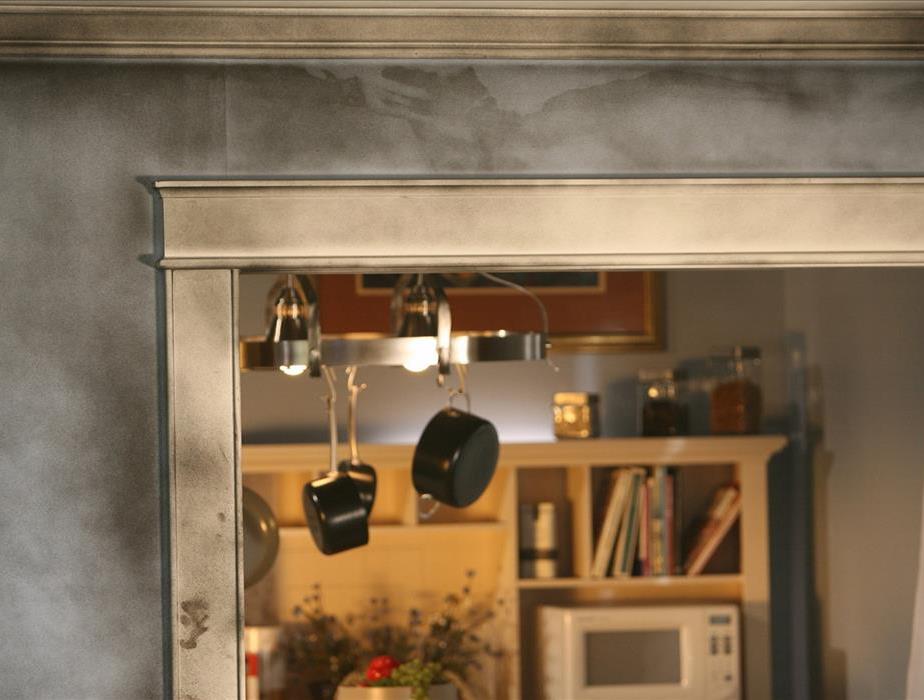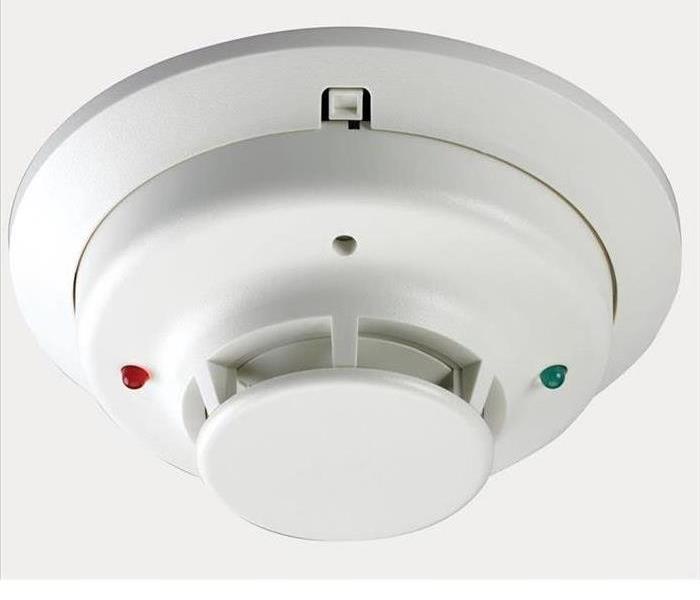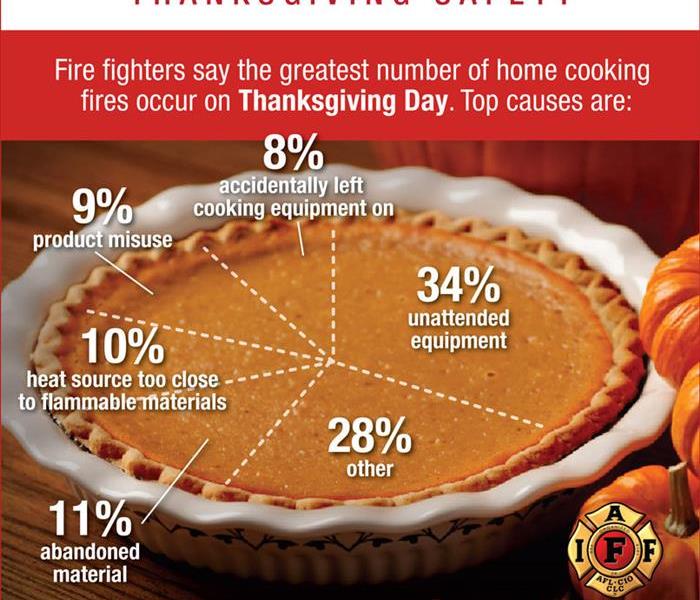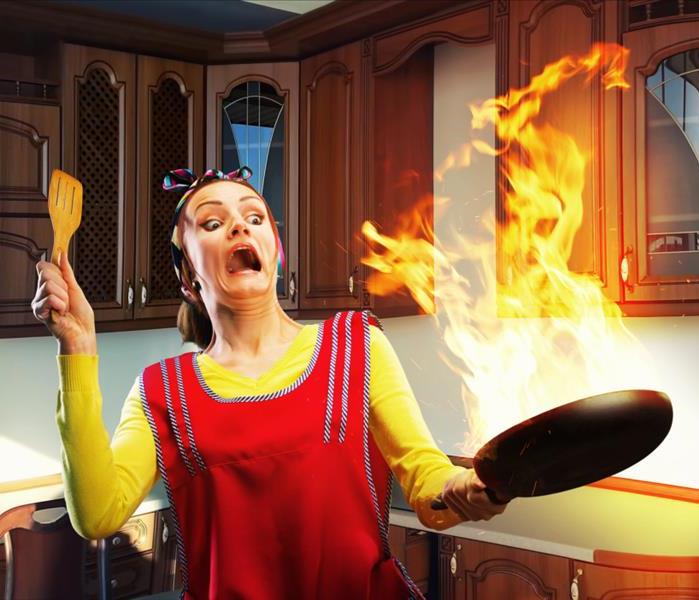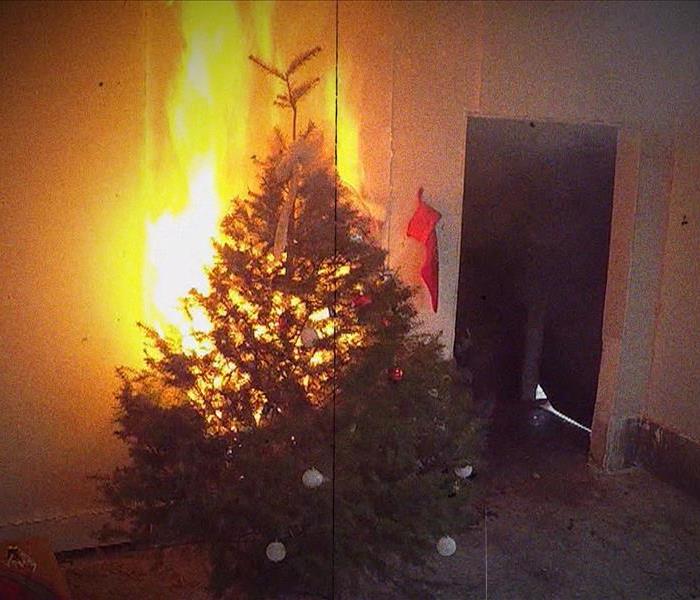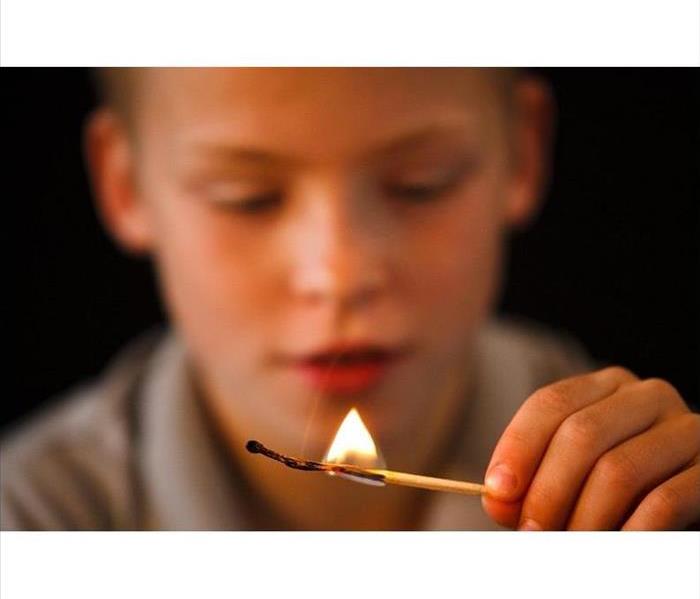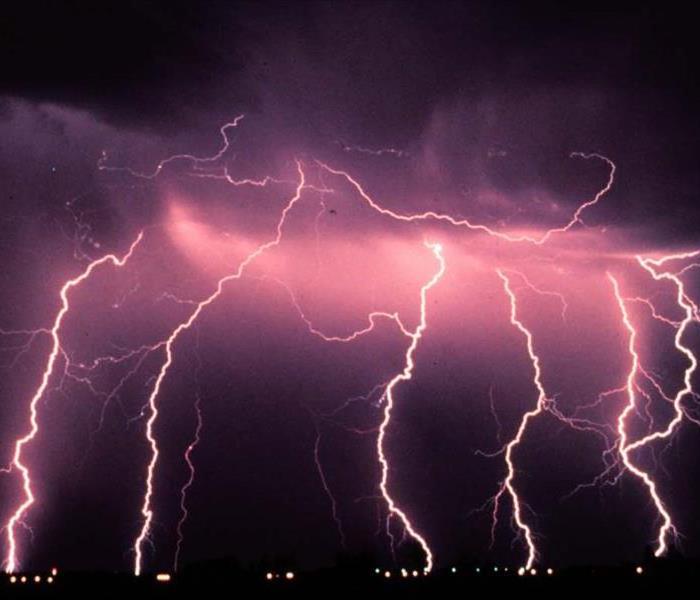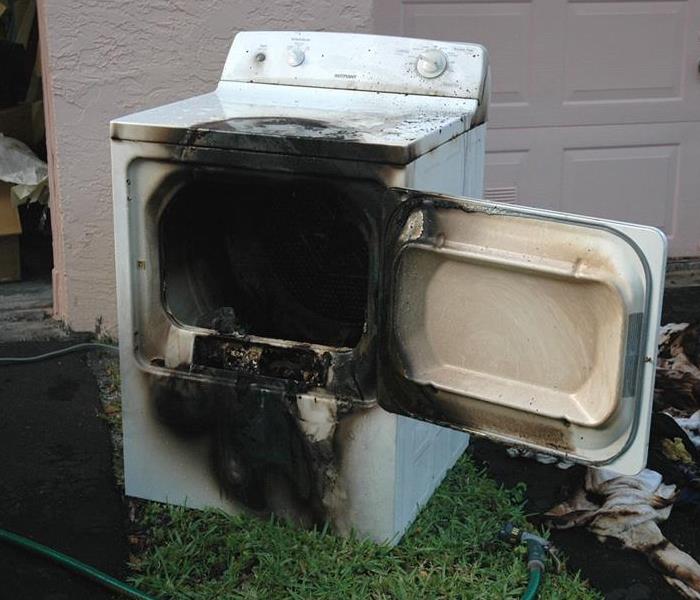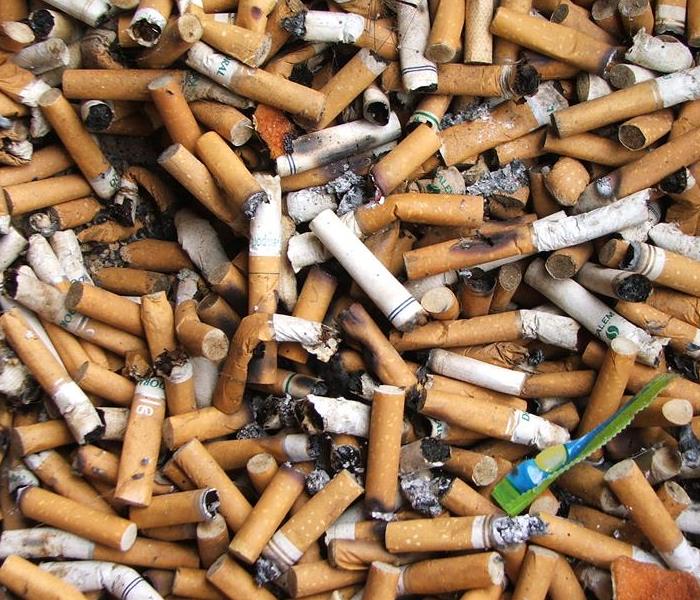Recent Fire Damage Posts
Fire-Proofing Your East Meadow and Westbury Home for the Holidays
11/6/2023 (Permalink)
A Step-by-Step Guide
The holiday season is a time of joy, celebration, and togetherness. It's a time when our homes come alive with the warmth of decorations, cozy gatherings, and the delightful aroma of home-cooked meals. However, it's also a season when the risk of house fires increases due to holiday decorations, cooking mishaps, and other factors. As your local SERVPRO of East Meadow/Westbury, we care about your safety and want to help you enjoy the holidays worry-free. Here are some essential tips for fire-proofing your home this holiday season.
Inspect and Maintain Your Heating System
As the temperatures drop, we rely more on our heating systems. Ensure your furnace, fireplace, and space heaters are in good working condition. Schedule a professional inspection if needed. Keep flammable materials away from heaters and always turn them off before leaving the room or going to bed.
Safely Decorate Your Home
Holiday decorations can be a significant fire hazard. Choose flame-resistant or flame-retardant decorations whenever possible. Keep candles in sturdy holders, away from flammable materials, and never leave them unattended. Opt for LED candles as a safer alternative. Inspect string lights for damaged wires and replace any faulty ones.
Be Cautious in the Kitchen
Cooking is a central part of holiday celebrations, but it can also lead to fires. Never leave cooking food unattended, especially when frying or broiling. Keep flammable objects like dish towels and oven mitts away from the stovetop. Install a fire extinguisher in your kitchen and make sure everyone knows how to use it.
Check Smoke Alarms
Ensure that your smoke alarms are working correctly. Test them monthly and replace the batteries at least once a year. Having a functioning smoke alarm can make all the difference in alerting you to a potential fire in its early stages.
Create an Escape Plan
In case of a fire emergency, have an escape plan in place. Share it with your family and practice it. Make sure everyone knows the safest exit routes and where to meet outside.
Keep Firewood and Outdoor Decorations Safe
If you have a fireplace or wood-burning stove, store firewood away from the house, and use a spark screen. Outdoor decorations should be fire-resistant and placed away from structures, trees, and shrubs.
Dispose of Wrapping Paper Safely
After opening gifts, dispose of wrapping paper in a non-combustible container. Avoid throwing it into the fireplace, as it can lead to a chimney fire.
Contact Us for Any Fire or Smoke Damage Restoration Needs
If you ever experience fire or smoke damage, don't hesitate to contact us. Our team at SERVPRO® of East Meadow/Westbury is available 24/7 to assist you. Your safety is our top priority, and we're here to make your home like new. Contact us for immediate assistance.
Why You Shouldn't Handle Fire Damage Restoration on Your Own
8/20/2023 (Permalink)
Rely on SERVPRO of East Meadow/Westbury for Fire Damage Repair and Restoration
Experiencing a fire in your home or business can be a traumatic event. While you might be tempted to handle fire damage restoration on your own, it's important to understand the complexities of the process. SERVPRO of East Meadow/Westbury is here to explain why professional fire damage restoration is the way to go.
Hidden Damage
Fire damage goes beyond what's visible on the surface. Smoke and soot can penetrate deep into materials, causing long-term odors and deterioration. Professionals have the tools and expertise to identify and address hidden damage effectively.
Health Risks
Soot and ash residue can contain harmful chemicals and toxins that pose serious health risks. Improper cleaning methods can release these particles into the air, risking your health. Professional restoration teams follow industry standards to ensure a safe and thorough cleanup.
Specialized Equipment
Fire damage restoration requires specialized equipment such as industrial-grade air purifiers, dehumidifiers, and ozone machines. These tools are essential for removing smoke odors, cleaning air quality, and preventing mold growth.
Comprehensive Restoration
Professional restoration addresses visible damage and includes comprehensive cleaning, deodorization, and structural repairs. Attempting to restore your property alone may result in incomplete rehabilitation, leading to further issues.
In conclusion, fire damage restoration is a complex process that requires professional expertise, specialized equipment, and a thorough understanding of safety protocols. When faced with fire damage in Nassau County, trust SERVPRO of East Meadow/Westbury to handle the restoration process. Our experienced team will ensure your property is restored to its pre-fire condition safely and effectively.
What Should I Do After a House Fire?
5/3/2023 (Permalink)
What Should You Do After a House Fire?
A house fire can be a traumatic experience for any homeowner; the aftermath may be overwhelming, and you might not know what to do next. If you experience a house fire of any magnitude, follow these steps to help you quickly get back on your feet.
Step 1: Ensure Your Safety
Remember: Your safety is the top priority after a house fire. Ensure everyone is out of the structure, and notify your local fire department. Please only reenter the house once it has been cleared as safe by the authorities.
Step 2: Contact Your Insurance Company
Reach out to your insurance representative immediately after the fire. Your agent can advise you on what your policy covers and which expenses you may be responsible for. Ensure you take photos (and videos), if possible, and make a detailed list of all damaged items for your insurance claim.
Step 3: Contact Fire Repair and Restoration Services
After the blaze has been extinguished and authorities have deemed the area safe, contact a reputable fire repair and restoration company — such as SERVPRO of East Meadow/Westbury. Our skilled team provides prompt and professional fire damage repair and restoration services, ensuring your home and belongings are restored as quickly as possible.
Step 4: Salvage Valuables (if Possible)
During the fire, you may have lost some of your possessions. However, if your home was deemed safe to reenter by local authorities, try to salvage any valuables that the blaze has not damaged. This may include important documents, family photos, and sentimental items like generational heirlooms.
Nassau County Fire Damage Repair and Restoration Services
At SERVPRO of East Meadow/Westbury, we understand that a house fire can leave you feeling lost and confused. You must take steps to ensure your safety, contact your insurance representative, and seek professional fire repair and restoration services once authorities say it's safe to enter the premises.
Don't hesitate to contact our team today if your Nassau County home has sustained fire-related damages.
Why Using Water to Extinguish Fires Can Be a Hazardous Choice
4/28/2023 (Permalink)
Fire is a chemical reaction that requires three elements: heat, fuel, and oxygen. When these elements combine in the right proportions, they produce flames and smoke. To extinguish a fire, it's essential to remove one or more of these elements.
Water, in particular, is a common choice for extinguishing fires. However, it's not always the best solution; in some cases, it can even be hazardous. Here's why:
Water and Fire Don’t Always Mix
Water is an excellent heat absorber but can negatively interact with some types of fires; for example, adding water to a grease or oil fire can spread the flames even further. This happens because water is denser than oil and will sink to the bottom, creating steam that can push flames higher.
Water can also create electrical hazards if used on electrical fires. Water conducts electricity, which means it can lead to electrocution if it comes into contact with electrical sources.
Alternative Methods
Using the appropriate fire extinguisher is safer and more effective than water. Different types of fires require different types of fire extinguishers. For instance, fires fueled by gasoline, oil, and other flammable liquids will need a Class B foam extinguisher. The foam helps to smother the flames and prevent re-ignition.
Electrical fires should be dealt with by cutting the power supply to the source or using a Class C fire extinguisher that uses non-conductive chemicals such as CO2.
Fire Damage Repair and Restoration Services in Nassau County
Suppose a fire has caused damage to your home; SERVPRO of East Meadow/Westbury can help with fire restoration services. Our team has the training, equipment, and experience to identify safety hazards, evaluate structural damage, remove debris from affected areas, and clean smoke damage.
Contact us today to learn more about how we can help you.
Does the Smell of Smoke Damage Go Away?
3/29/2023 (Permalink)
Residential Smoke Damage: FAQs
Being a homeowner can be stressful — especially if you’re dealing with the aftermath of a fire or smoke damage. The physical damage that occurs is just one part of the problem. The other part often not discussed is the smell that lingers long after the damage has been repaired. As homeowners, we want to know if that smell ever goes away.
In this blog, we’ll answer that question and hopefully alleviate some of the stress and worry associated with this issue.
Will the Smell of Smoke Damage Go Away?
The short answer to this question is yes; the smoke damage smell can go away. However, this is only sometimes the case. The extent of the damage and the type of smoke that affected the house play a significant role in whether or not the smell goes away. If the damage was extensive, and the smoke was thick and heavy, the scent may linger for quite some time. It may take several rounds of cleaning, deodorizing, and even repainting to eliminate the smell fully.
The best thing you can do as a homeowner is to hire a smoke damage restoration company, such as SERVPRO of East Meadow/Westbury. These companies have experience removing smoke damage and the necessary equipment and expertise to do the job correctly. They use specialized cleaning techniques to remove soot and smoke damage deeply ingrained in household surfaces. They also have access to professional-grade deodorizers that penetrate every crevice of your home, eliminating even the most stubborn odors.
How Soon Should I Have a Smoke Damage Problem Addressed?
It’s important to note that time is of the essence when dealing with smoke damage. The longer you wait to address the issue, the harder it will be to remove the smoke smell. This is because the longer the smoke, soot, and ash particles sit on the surfaces of your home, the more they will seep into the materials, making them harder to remove. If you act quickly and hire a professional restoration company, you’ll have a better chance of successfully eliminating any smoke damage smells.
Fire Damage Repair and Restoration in Nassau County, NY
In conclusion, the smell of smoke damage can disappear, but it’s not always a simple process. It takes time and patience and often requires the expertise of a professional smoke damage restoration company. The best course of action is to act quickly, as the longer you wait, the harder it will be to remove the smell.
By hiring a professional, you can be sure that your home will be restored to its pre-damaged state, with no lingering smoke damage smells. If your Nassau County home sustained smoke damage, your friends at SERVPRO of East Meadow/Westbury are here to help; contact us today: (516) 334-2927
Fire Extinguisher 101: Understanding the Different Types and Their Uses
2/3/2023 (Permalink)
What are 3 Types of Fire Extinguishers I Should Know About?
Fire extinguishers are an important tool for every home. Whether you're a homeowner or a renter, having access to fire extinguishers can help you put out small fires quickly and safely before they become unmanageable. But did you know that there are different fire extinguishers designed for different types of fires?
The Nassau County fire damage repair and restoration professionals at SERVPRO of East Meadow/Westbury look at the different types of fire extinguishers available and when to use them.
Water-Based Extinguishers (Class A)
The most common type of fire extinguisher is the water-based one, usually labeled with a "Class A" rating. Water-based extinguishers are designed for Class A fires involving combustible materials such as paper, wood, cloth, rubber, and plastics. These extinguishers work by cooling the burning material so that it can no longer sustain combustion.
Carbon Dioxide Extinguishers (Class B)
Carbon dioxide (CO2) fire extinguishers are designed for Class B fires, which involve flammable liquids such as gasoline, paint thinners, and cooking oils. CO2 works by displacing oxygen from around the blaze; without oxygen, the fire cannot continue to burn. CO2 fire extinguishers typically have a curved handle and a horn-like nozzle at the top.
Dry Chemical Extinguishers (Class C & D)
Dry chemical fire extinguishers come in two varieties: ABC dry chemical for Class C & D fires and BC dry chemical for Class B & C fires only. ABC dry chemical is designed for electrical equipment and combustible materials; it creates a barrier between the fuel source and the oxygen necessary for combustion.
BC dry chemical is specifically designed for Class B & C fires involving flammable liquids; it smothers the flames by coating them with a thick foam layer. Both types of dry chemical fire extinguishers have a pressure gauge on their side that indicates whether or not they have been discharged or need refilling or maintenance.
Nassau County Fire Damage Repair and Restoration Professionals
As you can see, there are several different types of fire extinguishers available depending on your needs. It's important to understand how each type works to choose the right one in an emergency; doing so could save your home from serious damage or destruction.
SERVPRO of East Meadow/Westbury is here to help if your home sustains fire-related damages; call us at (516) 334-2927 or fill out a quick online form to learn more.
Ways to Prevent a Fire During the Holiday Season
11/21/2022 (Permalink)
What are 3 Ways to Prevent Fires During the Holidays?
The holidays are a great time of year, but they’re also when home fires are more common. In fact, December is the peak month for house fires caused by holiday decorations, according to the National Fire Protection Association.
Knowing this, the highly trained Nassau County fire restoration technicians at SERVPRO of East Meadow/Westbury are here to share some helpful tips to prevent a fire in your humble abode:
1. Inspect Your Lights
Before you hang up any holiday lights, check them for damaged or frayed wires, cracked sockets, and loose connections. If any of your lights are broken, throw them away and replace them with new ones. It’s also a good idea to plug outdoor lights and decorations into a ground fault circuit interrupter (GFCI) outlet to help prevent fires.
2. Only Use a Fresh Tree
If you’re a fan of having a real tree in your home, make sure it’s fresh before you pick it up from the lot, drive home, and carry it through the front door. For reference, a new tree will have vibrant green needles that don’t fall off when touched (they’ll stay in place). Once you find your “winning” tree, set it in place, and decorate it, it’s vital to keep it watered so it doesn’t dry out and become a fire hazard when you least expect it.
3. Be Careful with Candles
Candles are a common cause of fires during the holidays. If you use candles in your home, be sure to blow them out before you leave the room or go to bed. It’s also a good idea to keep candles away from anything that can catch fire, like curtains, trees, and decorations. If you’re looking for the same ambiance as real candles but want to take a safer approach, consider using battery-operated candles instead to help prevent fires.
Nassau County’s Leading Fire Remediation Experts
When it comes to fire damage, immediate action is vital. Our team of fire repair and restoration experts at SERVPRO of East Meadow/Westbury understands this and will help you get back on your feet in no time. To learn more about our Nassau County fire damage repair and restoration services, contact us at (516) 334-2927.
What Should You Not Do After a House Fire?
4/25/2022 (Permalink)
What Not to Do After a House Fire
One of the most unfortunate events a homeowner can endure is a house fire. Whether the blaze was big or small, it’s not something that can be taken lightly. And although you may feel inclined to enter your home after the incident and begin picking up the pieces, you should avoid doing that at all costs.
The Long Island fire damage and restoration professionals at SERVPRO of East Meadow/Westbury share a few suggestions of actions you should not take immediately after a house fire.
Do Not Re-Enter the Home
You mustn’t re-enter your home until your local fire authorities have declared that it is safe. For instance, although your humble abode may appear fine on the outside, there could be hidden structural damage on the inside — and one wrong move could lead to a very dangerous situation. Another thing to consider is that there may be asbestos contamination unbeknownst to you. Regardless, avoid going back into your home until the coast is clear.
Do Not Turn on Utilities
Even if it appears the fire caused minor damage, do not turn on the gas, water, electricity, or other utilities in your home until you’ve received the “green light” from the Fire Marshal. For example, since you will not know the extent of damage caused to your home’s electrical system at first glance, it could spark another fire or create another dangerous situation should you turn it on without having it inspected by authorities.
Do Not Clean the Damage Yourself
Once you’ve contacted your insurance company and the Fire Marshall has stated that you can re-enter your home, do not start cleaning the damage yourself. While it may seem simple at first glance, it can be much more dangerous than what meets the eye. For instance, fires bring along a variety of hazards — sharp objects and broken glass, to name a few — and without the proper tools and techniques, you could injure yourself.
Another important thing to consider is that a professional fire damage repair and restoration company will be able to restore a multitude of items. From flooring to furnishings, a team of experts will be able to assess the damage to each item properly and, in most cases, revive them as if nothing had happened in the first place.
Fire Damage Repair and Restoration Services in Nassau County
Locally owned and operated, SERVPRO of East Meadow/Westbury is a trusted leader in the restoration industry. We understand how devastating a fire of any size can be and only employ the utmost empathy before, during, and after the process. If your Nassau County property has sustained fire damage, call us at (516) 334-2927.
Fire Hazards to pay attention to.
2/4/2022 (Permalink)
When winter is in full swing, temperatures are cold and we are using our fireplace or space heater to keep us warm, keep aware that these items can cause damaging house fires. However, there’s always the possibility of a fire starting from something other than this and from what may seem like nothing at all. While we understand fire damage can be devastating, it’s important to identify and understand what can actually cause the fire damage. Below are a few changes you can make to your home to help prevent the devastation and damage that comes from a fire.
Outlets
With holiday decorations, space heaters (we know you use them…) and all of those new electronic presents you received, these items can take a toll on our entire electrical system! While plugging in your surge protector can be a big help, it can still eventually become too much for your breaker and cause a surge or start a fire. Should this happen to you, big or small, make sure you have trained technicians on-site to assess and repair any of the damage.
Dry Air & Brush
It’s important to also note that the area surrounding your home or business should also remain clear and free of debris and brush. Whether it’s a dropped cigarette or a spark from the firepit, a dry day can turn the entire area into a fire hazard. Make sure to clean up those empty delivery boxes, that the residual fall leaves are all raked up and recycled properly in order to promote less of a fire risk in your area!
If you find yourself experiencing a fire, make sure your first step is to get everyone to safety. When it comes to managing the damage, make sure the team you call is professional and swift. SERVPRO of East Meadow/Westbury is at the ready 24/7, no matter the emergency. To receive assistance for fire damage, get in contact with us by calling 516-334-2927, today!
Common Causes of Home Fires
12/29/2021 (Permalink)
No one wants to endure the effects of a fire at home -- and especially the water damage that comes from putting it out. In many cases, there are a ton of ways to prevent fires - and most of the fixes are fairly common! Below are just a few things that cause fires and a number of ways to prevent them from occurring in your home or business
Space Heaters
Like you, we enjoy the comfort that space heaters provide on chilly winter days. However, these appliances are a leading cause for destructive fires across the country. First, you need to keep anything flammable at least three feet away from the heater, as well as keeping items that can knock into it, far away. You should always turn off your space heater when you go to bed or leave the home. Make sure to set a timer if you’re going to be sleeping, and monitor the filter for anything that can cause a fire.
Dry Air and Flames
Since winter brings dry air, it's important to watch out for home damage that can be caused by fires due to dry air in your home. A fireplace screen is a must while enjoying your time near the heat. When the fire is done, place cooled ashes in a metal container and store them away from your home. Don't forget to put the matches you used to start the fire out of reach of children. Any embers, open flames or hazardous material that could help start or spread a fire should be brought outside of your home or safely suppressed.
Let’s face it -- almost everyone loves the smell of candles this time of year, but make sure the flame stays at least one foot away from anything that could burn or catch fire. The National Fire Prevention Association says that 11% of candle-caused home fires involved someone falling asleep while the candle was lit, so if you’re getting to the end of your evening, it might be a good idea to put out the candle preemptively.
Appliances
Any appliance with a frayed cord poses a fire hazard and you should stop using it immediately. We recommend you take extra care with heat-producing appliances to ensure total safety. Microwaves, irons, dryers, hair tools and stoves should be turned off before you leave home. PLEASE REMEMBER, while you're cooking, the stove should never be left unattended.
When damage occurs to your home it's only a matter of time before the damage worsens. Call us at 516-334-2927 to schedule time to speak with us at SERVPRO of East Meadow/Westbury and we’ll make sure that your damage is handled appropriately, in no time!
Christmas Tree Fires
12/15/2021 (Permalink)
After saying goodbye to Christmas recently, many people have trees that start to die and are at risk of starting a house Fire. On average, one of every 34 Christmas tree Fires results in a death. That is compared with an average of one death per 142 total reported home Fires. The NFPA recommends that trees be removed once they lose their fresh smell and all their needles begin to fall. The NFPA would recommend you to not lean the tree against the home as that is also a Fire hazard. Most trash services will pick up old Christmas trees placed next to receptacles at the curb over the next couple of weeks. Dying Christmas trees are just a Fire waiting to happen and you'd rather be safe than sorry!
Fire Prevention At Home
10/21/2021 (Permalink)
The last thing any homeowner wants to do is worry about a fire -- although it has a convenient way of creeping into our minds on a semi-daily basis -- or more! When it comes to preventing fires, everyone knows the basics, and not to leave stoves on, hot things plugged in, and the whole nine. But during the warmer months, this can be a bit different, and may need more attention. Below are a few ways to prevent summer fires at your home!
Check the Dryer
Hot dry temperatures and dry flammable products usually don’t mix well, and your dryer can be a big risk. Make sure that your dryer’s lint tray is always emptied and never left unattended when running. This seemingly harmless appliance is actually the cause of many home fires, and it can do big damage!
Electric Outlets
Let’s face it, looking for another outlet to plug in a fan to cool down is a mindless task completed by many, but sometimes without thought of surges. Think about how many things are plugged in and running, and compare it with the limits of your breaker and outlet. The last thing you need on a hot day is a power surge which leads to a fire tearing through them home. Not cool -- get it?!
Should you be on the wrong end of a fire during the warmer months of the year, make sure your home is being taken care of and restored as soon as possible. SERVPRO of East Meadow/Westbury has been providing emergency restoration services to homes and businesses for over 50 years. For 24/7 emergency service, make sure to keep our number handy and contact us with anything you might need!
Fire Prevention Tips For Home and Business Owners
10/11/2021 (Permalink)
When you own residential or commercial property, you must prevent the potential for fires at all costs. Business and home damage from fires is much more complex than it seems, due to problems from smoke, soot and water damage. While you may remember to have smoke detectors or water sprinklers in a building, there are additional ways to prevent dangerous fires.
Prevention Tip 1: Open Flames
If you have fireplaces in your home or business, you should use extra precaution to cope with the dangers from open flames. Make sure to have a fire screen in front of the fireplace at all times. In addition, you should have nonflammable materials next to the fireplace rather than having rugs or carpeting that can begin to burn quickly. Keep any open flames secluded and away from dry, flammable material.
Prevention Tip 2: Common Hazards
You should have a concern about the most common fire hazards in a building, including faulty electrical wiring, poor storage of combustible materials and smoking on the premises. Make sure to have an electrician check the electrical wiring in your building, check for potential issues with power surges, and store any dangerous materials in a safe area.
Prevention Tip 3: Seasonal Issues
There are frequent fires in buildings that are caused by having too many decorative light strands or leaving lighted candles in dangerous places. If you’re someone who enjoys the Christmas lights up all year, it’s important to address the potential for a fire, Additionally, all of the space heaters used, gas on hand for snow blowers, fireplaces and more can cause a destructive blaze.
At SERVPRO of East Meadow/Westbury, we know that fire damage isn’t limited to just the blaze. If you’ve experienced the unfortunate wrath of a fire at your home or business, it’s important to get in contact with a company that knows what to do in order to restore the damage. To learn more, call us at 516-334-2927 for immediate assistance!
Battling Fires By Preventing Them
10/5/2021 (Permalink)
No matter the time of year, a damaging and sometimes deadly fire is likely last on the list of things that you’re going to want to deal with -- no matter where it occurs! In order to prevent fires from happening in the first place, there has to be a plan in place that has been proven to work, and doesn’t require outweighing efforts. Below are a few fire prevention tips you can use at your home or office this summer to monitor and keep fires from happening.
Inspect Electricity
We know that due to the heat outdoors, the air conditioning is likely going to be turned on, and set to a low temperature. With this in mind, it’s important to monitor how many things may be running at any given time, and inspect your breaker box, outlets, power strips and more for wear & tear, or decreased performance. These small changes in how they operate may be indicative of an issue that lies within your electric. Failure to notice and have these diagnosed may lead to an electric fire, which can spread fast, and be very costly.
Prevent Dry Air & Surroundings
Making sure that already hot air doesn’t pose a fire risk can seem tricky, but it isn’t as hard as you may think. Continuing with the inspection theme from above, make sure that the surroundings of your home aren’t becoming too dry and are not at risk for a fire. Plants and shrubbery that sit in direct sunlight can be an issue when they’re exposed for too long and become counterparts to a fire.
Know Where Your Emergency Equipment Is
If you haven’t done it already, make sure to know where and to utilize emergency equipment on a frequent basis. Whether this is in your car’s trunk or in the kitchen in an accessible spot, a fire extinguisher is a great piece of equipment to have handy. This can prevent a small fire from becoming a larger one, which can save your home, and even lives.
Should you be on the wrong end of a fire during the warmer months of the year, make sure your home is being taken care of and restored as soon as possible. SERVPRO of East Meadow/Westbury has been providing emergency restoration services to homes and businesses for over 50 years. For 24/7 emergency service, make sure to keep our number handy and contact us with anything you might need!
How Likely Is A Home Fire This Winter?
9/6/2021 (Permalink)
The winter -- associated mostly with cold weather, snow, annoying wind and early darkness -- but rarely does the topic of fire come up during the winter. In your home or business, while it’s cold and wet for much of the season, a fire can be just as common, if not sometimes more prevalent during these months. While you might be wondering why, it’s simply due to the need for heat and fire to help warm homes and business on a constant basis. Space heaters, home heating systems, candles and more are used to so much more during the winter than they are in the summer -- and with that comes the risk for more fire.
How Likely Is A Home Fire?
We would like to help you make it less likely, so in order to properly answer a question like this, let’s assess the risk factors associated with a fire and make some changes, if necessary.
- If you have open flames, such as candles on tables and desks, even for decorative purposes, make sure they’re away from materials that can easily catch fire. This includes fabric, plants, and anything else that is dry and could get in between your candle’s flame and home.
- A space heater can be a great way to keep a specific room or rooms warm during the winter months -- but they use electricity, and some of them aren’t as safe as they seem. The metal grills on some heaters can come in contact with fabrics and cause fires, as well as an accidental tip-over causing an issue as well. Both of these are huge risks, so make sure you’re keeping them in check when operating
- Is electricity going to be running constantly? If so, make sure all wires are properly tucked and not in the way of anything that could get wet, or cause compromise to the electrical system. This is mainly because, electricity and water simply don’t mix. Not only can this lead to a fire, but it can also seriously injure someone who comes in contact with it.
If you’re in need of immediate damage restoration for any reason, make sure to partner yourself with a team that can make the situation right the first time. SERVPRO of East Meadow/Westbury has been assisting home and business owners recover from damage for years, and we’d love to help you! Contact us today and we’ll show you how we can make everything right again. 516-334-2927
Classes of Fire - A, B, C, D, and K
2/2/2021 (Permalink)
Fires are classified by the types of fuel they burn.
Class A
Class A Fires consist of ordinary combustibles such as wood, paper, trash or anything else that leaves an ash. Water works best to extinguish a Class A fire.
Class B
Class B Fires are fueled by flammable or combustible liquids, which include oil, gasoline, and other similar materials. Smothering effects which deplete the oxygen supply work best to extinguish Class B fires.
Class C
Class C Fires. Energized Electrical Fires are known as Class C fires. Always de-energize the circuit then use a non-conductive extinguishing agent. Such as Carbon dioxide.
Class D
Class D Fires are combustible metal fires. Magnesium and Titanium are the most common types of metal fires. Once a metal ignites do not use water in an attempt to extinguish it. Only use a Dry Powder extinguishing agent. Dry powder agents work by smothering and heat absorption.
Class K
Class K Fires are fires that involve cooking oils, grease or animal fat and can be extinguished using Purple K, the typical agent found in kitchen or galley extinguishers.
SERVPRO of East Meadow/Westbury stands ready to assist with fire damage, small or large events, residential and commercial.
Smoke Alarm Facts
12/19/2020 (Permalink)
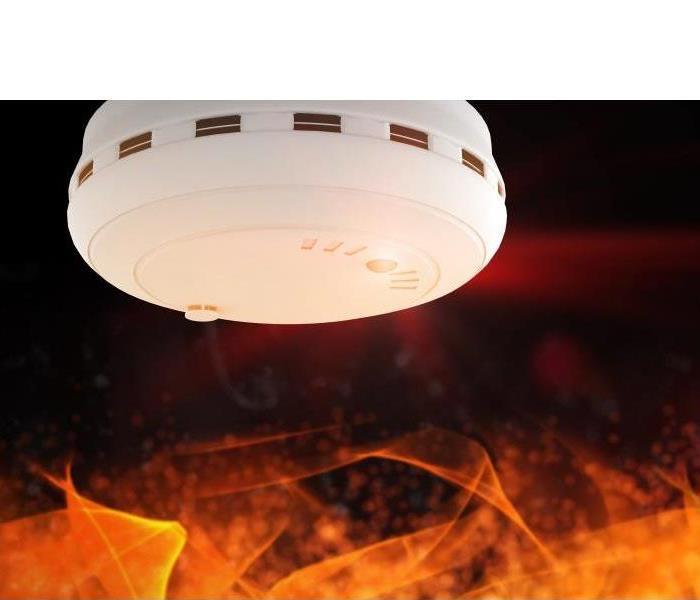 Smoke Alarms Save Lives!
Smoke Alarms Save Lives!
We all know that Smoke Alarms save lives. Smoke alarms must be installed and maintained properly, however, to be effective. Here are some facts and stats from the NFPA:
- A closed door will slow the spread of smoke, heat and fire. Smoke alarms should be installed in every sleeping room and outside each separate sleeping area, and on every level of the home.
- Smoke alarms should all be interconnected, when one sounds, they all should sound.
- Large homes will generally need extra smoke alarms.
- Test all of your smoke alarms at least once a month. Press and hold the test button to be sure the alarm is working.
- Today’s smoke alarms are more technologically advanced and may respond to a multitude of fire conditions, yet mitigate false alarms.
- When a smoke alarm sounds, immediately get outside and stay outside.
- Replace all smoke alarms in your home every 10 years regardless of technology type.
Smoke Alarm Statistics
- In 2012-2016, smoke alarms sounded in more than half (53%) of all the home fires reported to U.S. fire departments.
- Almost three out of every five home fire deaths resulted from fires in homes with no smoke alarms (40%) or non working smoke alarms (17%).
- No smoke alarms were present in two out of every five (40%) home fire deaths in the US.
- The death rate per 1,000 reported home fires was more than twice as high in homes that did not have any working smoke alarms compared to the rate in homes with working smoke alarms (12.3 deaths vs. 5.7 deaths per 1,000 fires).
- In fires in which the smoke did not work, more than two of every five (43%) of the smoke alarms had missing, or disconnected batteries.
- Dead batteries caused one-quarter (25%) of all of the smoke alarm failures.
Safety is a job that's never finished. We at SERVPRO of East Meadow/Westbury are the experienced experts on smoke and fire damage.
Please call us at: 516-334-2927
Christmas Tree Fire Prevention
12/9/2020 (Permalink)
After saying goodbye to Christmas later this month, many people have trees that start to die and are at risk of starting a house fire. On average, one of every 34 Christmas tree fires result in a death. That is compared with an average of one death per 142 total reported home fires. Some basic precautions can eliminate many of these incidents.
- Make sure the tree is at least three feet away from any type of heat source, such as fireplaces, radiators, heat vents and especially candles.
- Ensure that all lights are in good working order, discard any with frayed wires or without proper electrical certification.
- The NFPA, or National Fire Protection Agency, notes that one in four Christmas Tree fires start from electrical issues, and an additional one in four start from heating devices placed too close to the tree.
- The NFPA recommends that trees be removed once they lose their fresh smell and all their needles begin to fall. The NFPA would recommend you to not lean the tree against the home as that is also a Fire hazard. Most trash services will pick up old Christmas trees placed next to receptacles at the curb over the next couple of weeks. Dying Christmas trees are just a fire waiting to happen and you'd rather be safe than sorry!
What's the Most Overlooked Cause of House Fires?
10/9/2020 (Permalink)
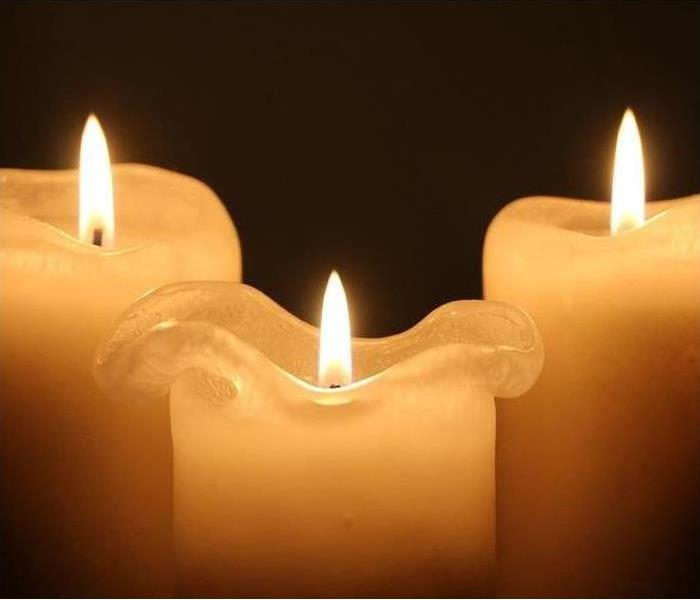 The hidden danger of candles
The hidden danger of candles
The first step to preventing house Fires is being aware of the main sources of the Fires. These can include everyday items that you may frequently forget about and before you know it you're calling SERVPRO to help clean up the damage.
An often overlooked cause of house Fires is from candles. Everyone loves the glow and smell of candles but are they really worth it? The NFPA says there was an average of 10,630 Fires in the U.S. causing 115 deaths, 903 injuries and approximately $418 million in property damage. Guess what these Fires were started from? That's right, candles! That is an average of 29 candle fires per day. Of course you can still use candles but use them responsibly. Some steps you can take are:
- Never leave a candle burning near flammable items.
- Never leave a candle burning in a child’s room or an unoccupied room.
- Make sure candles fit securing into candle holders so they won’t tip over.
- Blow out any candles before leaving a room or going to sleep.
SERVPRO of East Meadow/Westbury wants you to know how to easily prevent a Fire in your home. If you should experience a fire, we stand ready to help with smoke and soot remediation as well as water damage restoration.
Commercial Fire Damage
9/29/2020 (Permalink)
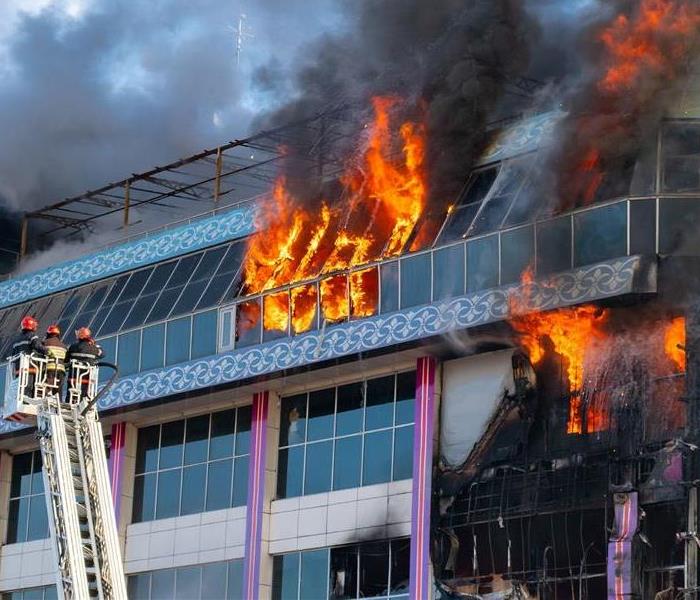 SERVPRO of East Meadow/Westbury has the team, training, and expertise to get your business up and running fast after a fire
SERVPRO of East Meadow/Westbury has the team, training, and expertise to get your business up and running fast after a fire
There's never a convenient time for fire or Water damage to strike you commercial property. Every hour spent cleaning up is an hour of lost revenue and productivity. When the need arises for professional cleaning or emergency restoration services we have the expertise to respond promptly with highly trained technicians to get your property back to business. Learn more about our commercial services here: https://www.SERVPROeastmeadowwestbury.com/commercial-restoration-services
- Commercial Water Damage Restoration
- Commercial Fire Damage Restoration
Different Types of Smoke
There are two different types of smoke–wet and dry. As a result, there are different types of soot residue after a fire. Before restoration begins, SERVPRO of East Meadow/Westbury will test the soot to determine which type of smoke damage occurred. The cleaning procedures will then be based on the information identified during pretesting. Here is some additional information:
Wet Smoke – Plastic and Rubber
- Low heat, smoldering, pungent odor, sticky, smeary. Smoke webs are more difficult to clean.
Dry Smoke – Paper and Wood
- Fast burning, high temperatures, heat rises therefore smoke rises.
Protein Fire Residue – Produced by evaporation of material rather than from a fire
- Virtually invisible, discolors paints and varnishes, extreme pungent odor.
Our Fire Damage Restoration Services
Since each smoke and fire damage situation is a little different, each one requires a unique solution tailored for the specific conditions. We have the equipment, expertise, and experience to restore your fire and smoke damage. SERVPRO - "Like it never even happened."
Have Questions about Fire, Smoke, or Soot Damage?
Call Us Today – 516-334-2927
Smoke and Soot Cleanup
8/7/2020 (Permalink)
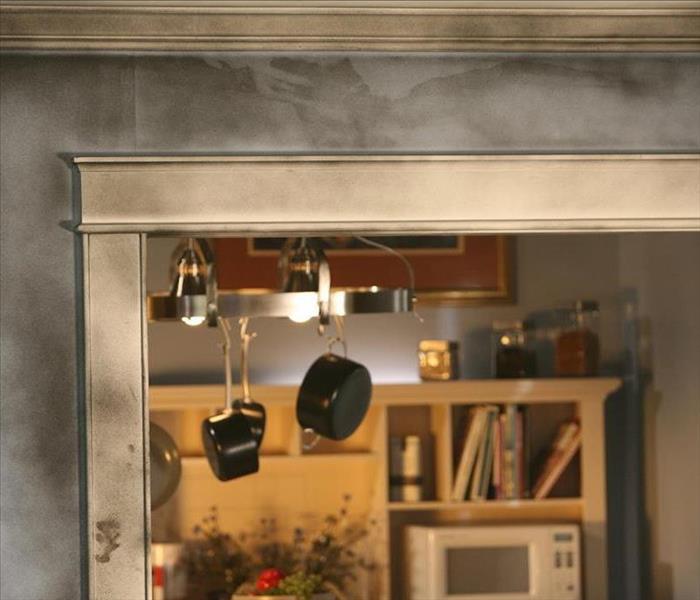 Look familiar ? call SERVPRO of East Meadow/Westbury today and we'll take care of the rest
Look familiar ? call SERVPRO of East Meadow/Westbury today and we'll take care of the rest
Smoke and soot is very invasive and can penetrate various cavities within your home, causing hidden damage and odor. Our smoke damage expertise and experience allows us to inspect and accurately assess the extent of the damage to develop a comprehensive plan of action.
Smoke and soot facts:
- Hot smoke migrates to cooler areas and upper levels of a structure.
- Smoke flows around plumbing systems, seeping through the holes used by pipes to go from floor to floor.
- The type of smoke may greatly affect the restoration process.
Different Types of Smoke
There are two different types of smoke–wet and dry. As a result, there are different types of soot residue after a fire. Before restoration begins, SERVPRO of East Meadow/Westbury will test the soot to determine which type of smoke damage occurred. The cleaning procedures will then be based on the information identified during pretesting. Here is some additional information:
Wet Smoke – Plastic and Rubber
- Low heat, smoldering, pungent odor, sticky, smeary. Smoke webs are more difficult to clean.
Dry Smoke – Paper and Wood
- Fast burning, high temperatures, heat rises therefore smoke rises.
Protein Fire Residue – Produced by evaporation of material rather than from a fire
- Virtually invisible, discolors paints and varnishes, extreme pungent odor.
Our Fire Damage Restoration Services
Since each smoke and fire damage situation is a little different, each one requires a unique solution tailored for the specific conditions. We have the equipment, expertise, and experience to restore your fire and smoke damage. We will also treat your family with empathy and respect and your property with care.
Have Questions about Fire, Smoke, or Soot Damage?
Call Us Today – 631-585-0007
What is a Furnace “puffback” and How Does it Make a Sooty Mess
2/19/2020 (Permalink)
A puffback is a result of serious damage in a homes heating equipment, which many homeowners can be unaware of. Below is some valuable information regarding puffbacks and how to help prevent heavy potential losses.
What is a furnace puff-back?
The term “puff back” represents technical damage that usually occurs in oil fired heating equipment. It is an explosion of un-burned oil, taking place in the combustion chamber of the furnace, water-heater or boiler. Based on the amount of oil being ignited, the puffback may radically damage the boiler, leading to soot spread all through the premises. Though most puffbacks are seen in oil-fired heating systems, the extent of damage is bigger in boilers and furnaces that are fueled by gas, since the explosion here is usually of larger in scale.
The Causes & Spread of Sooty Mess
The puffback explosion occurs due to the ignition of unburned oil lying in the bottom of the heating equipment combustion chamber. The degree of this explosion and its impacts on the building differ on the basis of:
- Amount of ignited oil
- Heater type
- Design of the equipment
- Heating conditions
- Building construction and spaces
- Doorways
- Ductworks, etc
Puffbacks may also result due to a partly cracked or clogged nozzle, inaccurate nozzle angle, cracked electrodes, improper adjustment of air-fuel mixture, a faulty spark transformer, low-grade or dirty fuel or shorted ignition cables.
Before a puff back occurs, most heating equipment systems start to show signs of a potential issue. Common indications include unpleasant odors and soot and smoke in your home. In addition, if you are hearing noises when the oil burner begins each run cycle, maybe a small “bang” or louder “puff” means that unburned oil is being ignited.
If you observe black debris or soot on the top of your furnace, boiler or water heater, and black soot streaks on walls or ceilings in your home’s furnace room, boiler room or living areas, it means you have a poorly maintained system that requires immediate attention and repair. The Puffback is not the main problem in itself, it’s the aftermath. Ceilings, walls, furniture, curtains and carpets, all are coated with a thin film of oil residue and soot. Generally, the damage becomes worse with a forced central air conditioning or air heating system, since the duck work gives a route for the soot to travel through the house, even into closets.
How can you avoid a puffback?
The best means to avoid dangerous and damaging oil burner puffbacks are:
- Have all your heating equipment serviced on a regular basis, preferably twice a year. Obtain the services of your home heating oil provider, licensed HVAC repair service or a home restoration company to do smoke damage cleaning and inspection.
- Stay alert for all noises, odors, soot in the furnace room, boiler room or anywhere in the home. Call professionals for inspection and diagnosis if any unusual condition is observed.
- Take preventive measures to avoid oil leaks on the oil piping systems and in the oil burner. Oil leaks may also cause air leaks.
Lack of timely inspection and regular service of oil-fired heating appliances will bring enormous risks such as loss of heat and related damages in your Long Island home, black walls and sooty mess all around, and the potential for more dangerous puffbacks in the future. If you are encountering any of these problems, call our home restoration emergency professionals at SERVPRO of East Meadow/Westbury (516-334-2927) right away, to get your system checked and repaired.
A Fire has damaged your property…. NOW WHAT?
1/8/2020 (Permalink)
What you do during the first 48 hours after fire damage can make the difference between restoring versus replacing your property and personal belongings. SERVPRO of East Meadow/Westbury can help prevent fire damage from causing long-term damage. Here are a few Fire Emergency Tips that will assist you in taking the proper action until the SERVPRO of East Meadow/ Westbury team is able to assist.
What TO DO After a Fire:
- Limit movement in the home to prevent soot particles from being embedded into upholstery and carpets.
- Keep hands clean so you do not further soil upholstery, walls and woodwork.
- Place clean towels or old linens on rugs, upholstery and carpet traffic areas.
- If the electricity is off, empty the freezer and refrigerator and prop doors open.
- Clean and protect chrome with light coating of petroleum jelly or oil.
- Wash houseplants on both sides of leaves.
- Change HVAC filter.
- Tape double layers of cheesecloth over air registers.
What NOT To Do After a Fire:
- Don't attempt to wash any walls or painted surfaces or shampoo carpet or upholstery without contacting your SERVPRO of East Meadow/Westbury Professionals.
- Don't attempt to clean any electrical appliances that may have been close to fire, heat or water without consulting an authorized repair service.
- Don't use any canned or packaged food or beverages that may have been stored near the fire, heat or water.
- Don't turn on ceiling fixtures if ceiling is wet. The wiring may be damaged.
- Don't send garments to an ordinary dry cleaner. Improper cleaning may actually set in the smoke odor.
The SERVPRO of East Meadow/Westbury Emergency Response team is available 24-hours a day, 7 days a week, to help you regain control of your property loss quickly. Reach out to us ASAP after you’ve suffered damage, so we can help you with all of the TO DO’s to ensure you and your property end this tough time with a happy result. Call us today at 516-334-2927
Checking your Smoke Detector!
3/16/2019 (Permalink)
With daylight saving time upon us, this is one of the best times of year to ensure your smoke and fire alarms are up and running! The smoke alarm is only beneficial to you if it functions properly, which means the alarm goes off when smoke is detected. Smoke alarms must be tested at least once a month. This can be done by pressing the test button and ensuring that the alarm beeps. If it does not, you need to fix or replace it immediately so that it is operational. It is important to note that a smoke alarm should never be tested by bringing a flame or heat source near the alarm. The elderly and those with disabilities who cannot reach the smoke alarms with ease can consider getting special smoke alarms installed. Be cautious that you do not damage your hearing while conducting this test.
Different Ways To Extinguish Different Fires(5)
3/9/2017 (Permalink)
First thing you should do is call 911 when you are first threatened by smoke or fire. You should also know that there are many different types of fires, and almost as many different ways to fight them. Understanding how to fight a particular type of fire may mean the difference between extinguishing the fire and making it worse.
Heating Fires
- Call the fire department if stovepipe is red or fire is in chimney. For furnaces, radiators, water heaters, immediately shut off. Smother if electrical. Use only water/Type A extinguisher if gas is the source. Douse a fire in fireplace with baking soda, water or Type A extinguisher if fire is up in the chimney.
- Dispose of cool ashes in lidded metal container. Never leave fire unattended. When burning, keep damper open, keep flammable material away and glass door/screen closed.
Different Ways To Extinguish Different Fires (4)
3/9/2017 (Permalink)
First thing you should do is call 911 when you are first threatened by smoke or fire. You should also know that there are many different types of fires, and almost as many different ways to fight them. Understanding how to fight a particular type of fire may mean the difference between extinguishing the fire and making it worse.
Storage Fires
- Smother with blanket or rug to cut off air supply. Use Type B extinguisher for rags, charcoal, liquids/solvents, hair spray/glue and Type A extinguisher for newspapers.
- Never put oily rags in a pile because they can ignite themselves. Store in labeled metal containers sealed with a tight lid.
- Newspapers: Avoid storing in a damp, warm place because newspapers generate heat and can ignite themselves. Store in cool, dry place at least 3 feet away from any heat-generating source, such as a pilot light.
Different Ways To Extinguish Different Fires(3)
3/9/2017 (Permalink)
First thing you should do is call 911 when you are first threatened by smoke or fire. You should also know that there are many different types of fires, and almost as many different ways to fight them. Understanding how to fight a particular type of fire may mean the difference between extinguishing the fire and making it worse.
Gas Fires
- Shut off gas supply. Smother with rug, blanket or Type B extinguisher or cool with water. Ventilate the area to let out the gases. Call the Fire Department to have the area pipes checked for further hazards. Then call the gas company. If there is a gas fire, it may be better to let the gas burn rather than extinguish the fire, which would let the gas fill the room or house creating the potential for an explosion. Therefore, the primary key is to shut off the gas supply and call the fire department.
Different Ways To Extinguish Different Fires(2)
3/9/2017 (Permalink)
First thing you should do is call 911 when you are first threatened by smoke or fire. You should also know that there are many different types of fires, and almost as many different ways to fight them. Understanding how to fight a particular type of fire may mean the difference between extinguishing the fire and making it worse.
Cooking Fires
- Shut off stove or oven, smother pan with lid, baking soda or Type B extinguisher.
- Smother fire in oven by keeping door closed and/or throwing baking soda on food. Never Move the Pan. It will fan the fire or splatter grease.
- Avoid letting grease build up in any part of oven. A greasy broiler can catch fire even during preheating.
- Keep combustibles away from stove, especially loose sleeves or scarves.
Different Ways To Extinguish Different Fires (1)
3/9/2017 (Permalink)
First thing you should do is call 911 when you are first threatened by smoke or fire. You should also know that there are many different types of fires, and almost as many different ways to fight them. Understanding how to fight a particular type of fire may mean the difference between extinguishing the fire and making it worse.
Electrical Fires:
- Switch off appliance and pull out plug. Smother fire with blanket or Type C extinguisher.
- Never use water because water conducts electricity and can cause an electrical shock.
- If you need to use a portable heater, Use one with thermostat (not just switch) that shuts off by itself when tipped over. Never leave on overnight. Use in an area free of combustibles and well ventilated for heat escape.
Preventing House Fires
1/9/2017 (Permalink)
House Fires start from many different sources and you can take many steps to make sure your home isn't in danger.
Did you know...On average:
- 7 people die every day from a home fire
- 36 people suffer injuries as a result of home fires every day
- Over $7 billion in property damage occurs every year
Can your family escape in just 2 minutes? You can keep your family safe with 2 simple steps:
Step 1. Practice your 2-minute drill. Make sure your family can safely escape a home Fire in under 2 minutes.
Step 2. Test your smoke alarms monthly. Make sure you and your family are alerted as soon as a Fire is detected. If the smoke alarm isn't working, change the batteries.
Also, make sure your everyday Fire starters are off like curling irons and candles!
Fire Waiting to Happen
12/13/2016 (Permalink)
There are things in your home that may be a ticking time bomb for Fire. Experts say that electrical panels may be a Fire just waiting to happen. The Clardy family remembered hearing a pop coming from the basement, their lights went out and they started to see many flames. The Fire spread all across their home and caused over $160,000 worth of structural damage. Can you believe it?! Dallas Fire-Rescue concluded that the Fire was started in the electrical panel in the garage. If you have one of these unsafe and outdated electrical panels, we highly recommend replacing them. At the very least, you should have an electrician inspect the panel to see if there are any signs of problems.
Thanksgiving Day Fires
11/9/2016 (Permalink)
With Thanksgiving coming up, people should know that Thanksgiving is the #1 Day for Home Fires. Thanksgiving has more than twice as many Fires as the next single day – December 25. “Thanksgiving is a wonderful family holiday, but the day can be ruined with a cooking or candle Fire, a burn injury or a carbon monoxide incident from long-term use of the oven,” said State Fire Marshal Stephen D. Coan.
Cooking Safety Tips:
- “Stand by your pan" and stay in the kitchen when boiling, frying or broiling.
- Use a timer when baking or roasting and never leave the house with the oven running.
- The best way to respond to a stovetop Fire is to “put a lid on it” and turn off the heat.
- The best way to respond to an oven or broiler Fire is to keep the doors closed and turn off the heat.
- If the Fire is not quickly snuffed out, leave the house and call the Fire department.
- Wear short or tight-fitting sleeves when cooking.
- Keep children 3-feet away from the stove for safety to prevent burns.
#8 Most Leading Cause For House Fires
11/6/2016 (Permalink)
Last but not least, the 8th most leading cause for house Fires is cooking! According to the NFPA, 40% of all house Fires, or an average of 156,600 per year, start this way, causing approximately $853 million in property damage. Two-thirds of the Fires started because the food or other materials caught Fire. Some tips you can follow are:
- Be alert when cooking and don’t leave food unattended.
- Don’t throw water on a grease fire, put a lid on the pan to smother the Fire.
- If an oven fire flares up, turn off the oven and leave the door shut until the Fire extinguishes itself.
- Keep clothing, pot holders, paper towels and other flammable items away from Fires.
- Having working smoke detectors in the house and keep a Fire extinguisher nearby just in case.
#7 Most Leading Cause Of House Fires
11/3/2016 (Permalink)
The seventh most common cause of house Fires are Christmas trees. Similar to candle Fires, Christmas tree Fires are more common during the holidays, 43% occurring in December and 39% in January. According to the NFPA, an average of 230 fires are attributed to Christmas trees each year. They are more likely to be serious because there are several factors that can contribute to the Fire. These include a dry tree, electrical lights and a fuel supply (gifts) under the tree. Christmas tree Fires cause an average of $18.3 million in property damage each year.
To prevent these Fires you should:
- Keep live trees well watered and dispose of them before they become dry.
- Turn off tree lights before leaving the house or going to bed.
- Check lights for any shorts or other electrical issues before putting them on the tree.
#6 Most Leading Cause Of House Fires
11/2/2016 (Permalink)
The sixth most common cause for house Fires is children playing with Fire. According to the NFPA, children start an average of 7,100 home Fires per year. This causes approximately $172 million in property damage. Did you know that most Fires caused by children are in the month of June? Also, males account for 83% of the Fires! Younger children under the age of six are more likely to start Fires inside, using matches or a lighter as the ignition source. Older children are more likely to start Fires outside.The most frequent sites for Fires are the bedroom (39%), kitchen (8%) and living room/family room/den (6%). Older children are more likely to start Fires outside. To prevent these Fires follow these steps!
- Keep matches, lighters, and other ignition sources out of the reach of children.
- Teach children fire safety at an early age.
- Make sure children have adequate supervision.
#5 Most Leading Cause For House Fires
10/26/2016 (Permalink)
The fifth most likely cause for a house Fire is lightning. Most house Fires occur in the winter months. However, lightning caused Fires happen most in June, July, and August in the late afternoon or early evening. According to the NFPA, there was an average of 22,600 fires per year caused by lightning strikes. Lightning poses the greatest risk outside and usually strikes the highest point on a structure. It can also ignite wildfires. Some ways to prevent lightning Fires are:
- Stay away from doors and windows during an electrical storm.
- Do not use corded phones, computers, TVs or other electrical equipment during storms.
- Unplug major electronics – TVs, stereo equipment, computers and microwaves to minimize damage if there is a lightning strike close by.
- Avoid plumbing such as sinks, baths, and faucets during a thunderstorm.
#4 Most Leading Cause Of House Fire
10/25/2016 (Permalink)
Believe it or not, the fourth most leading cause of house Fires are washing and dryer machines! Even though it's hard to believe, these Fires accounted for 16,800 home structure Fires in 2010 and they did more than $236 million in property damage. In dryers, Lint/dust caused 29% of the Fires and clothing caused 28%. In washing machines, wire or cable insulation caused 26%, the appliance housing caused 21% and the drive belt caused 15%. The risk of fire is about the same for both gas and electric-powered dryers. Of course like anything else, there are safety tips you can take to prevent these Fires. Follow these guidelines and your house should be Fire free!
- Clean the lint screen frequently and don’t run the dryer without it.
- For gas and propane dryers, make sure there aren’t any leaks in the lines.
- Vent the dryer to the outside of the house and ensure nothing blocks the vent pipe.
- Clean the vent pipe and the area where the screen is housed.
- Keep the area around the dryer free of combustible materials.
#3 Most Leading Cause Of House Fires
10/22/2016 (Permalink)
The third most common cause for house Fires is electrical and lighting Fires. These Fires can have multiple origins. Most Fires are caused by equipment malfunction, an overloaded circuit or extension cord, an overheated light bulb, space heater, washer, or dryer. The NFPA calculated that in 2001 there were about 47,700 homes set in flames caused by some sort of electrical failure or malfunction. Unfortunately, there have been 418 deaths, 1,570 injuries and $1.4 billion in property damage just from these Fires! Wiring accounted for 63% of the fires. Of course, there are steps that can be taken to keep you home safer when it comes to Fires. Here are some things you can do to prevent Fires from electrical and lighting:
- Don’t overload outlets or electrical cords.
- Don’t ever leave Christmas lights, Christmas trees, or halogen lights on overnight or when not at home.
- Make sure you have the right cord for the job – inside cords for inside, heavy duty/outside cords for outdoor use.
- Have an electrician perform an annual checkup of your home’s wiring.
Stay Tuned for 5 more common causes for house Fires and how YOU can prevent them!
#2 Most Leading Cause Of House Fires
10/20/2016 (Permalink)
The second most leading cause of house Fires is, can you guess it? Its Smoking! According to the NFPA, there were a whopping average of 17,600 fires per year resulting in 490 deaths and more than $516 million in property damage! And this happened all from smoking. Thankfully, the number of house Fires from smoking has dropped by 73% from 2008 to 2011. This is due to a decline in the number of smokers. Some new regulations created non-flammable mattresses, clothing and furnishings. This helped the drop dramatically. Almost half the individuals killed in these types of house fires were 65 or older.
What can you do to stop these risks?
- Smoke Outside.
- Get a good, wide, sturdy ashtray to collect the cigarette butts and ashes.
- Don't smoke in bed.




 24/7 Emergency Service
24/7 Emergency Service
